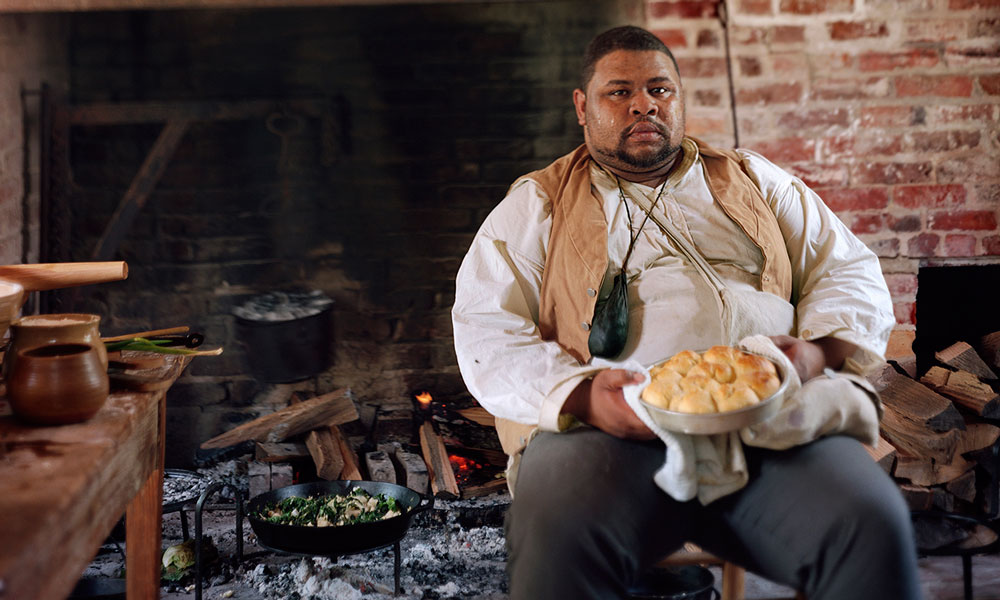Talk of the Table | Michael Twitty’s Kosher Soul Food

Chef Michael Twitty—a writer, culinary historian, cook and Hebrew school teacher—is an African American Jew (he converted at age 22) who uses his culinary prowess to explore the threads of his identity. In 2013, he became a well-known presence in culinary circles when he wrote an open letter to celebrity chef Paula Deen, which quickly went viral: Deen’s use of the n-word had recently come to light, but Twitty was more upset by her erasure of black contributions to the culinary world. “We are surrounded by culinary injustice,” he wrote, “where some Southerners take credit for things that enslaved Africans and their descendants played key roles in innovating.” Twitty’s new book, The Cooking Gene, explores the history of African American cuisine and its contributions to American Southern food with what he characterizes as a “very Jewish-meets-black-sensibility.” He speaks with Moment about the symbolism of Jewish and African foods, and how the two culinary traditions differ and come together.
You write that you feel an obligation to understand what your ancestors ate and how they ate it. Why?
This is a very Jewish question: Why do I feel this responsibility to observe these laws, these rituals, argue about their meaning? We’re still talking about things that were created thousands of years ago. In black culture, tradition is tradition. If Grandma says bow your head and say grace, you do it. There is no inner dialogue about the meaning.
But for me, African Americans should feel obligated to do this journey, in their own way, because our ancestors are depending on us to make their memory a blessing and honor their legacy. We need to appreciate where we are and appreciate that our descendants may have things easier than us, and therefore they may forget.
Why do you believe that it is critical to strive for “reconnection with the culinary culture of the enslaved”?
You can have conversations around food that are a little bit more difficult to have otherwise—conversations about power, access, exploitation, agency. In fact, food as an artifact weaves itself in and out of hair-raising conversations about race. When people know that black-eyed peas came from Africa—that they were fed to enslaved Africans who were underweight so they would get fatter or heavier, so they could survive and look well fed after the journey from Africa to America—they know that the black-eyed peas have symbolism. When black-eyed peas get to their plate, they understand where they come from.
You say that Jewish food is text expressed upon the table. What do you mean by that?
In the Torah, the basic ingredients of the whole Passover seder ritual are spelled out, and in the Mishnah, they’re spelled out even further.
So recipes are artifacts, so to speak, from the lives of our ancestors?
Yes. They’re basically the reincarnation. I say “reincarnation” rather than “apparition” because they’re not exactly the same. They change. They have to change so that they matter to the generation receiving them.
You first wanted to convert to Judaism at age seven. How has your relationship to Judaism changed since then?
At age seven, I did not know that Judaism was a religion of questions. I knew it was a religion of tradition, and I knew that it had some kind of oppositional relationship to Christianity. At age 40, I know that Judaism doesn’t need to have an oppositional relationship to anything. At the same time, Judaism has the same wonder to me that it did when I was seven. That feeling of must, the word must: I must. I should. I am. That’s all immovable to me. I must do this to improve my outlook on my own humanity. So therefore I must pray. Therefore I must eat this way. Therefore I must do this ritual. Therefore I must join other people to do this.
How does Jewish food play into your culinary thinking?
To me, Jewish food is revelatory. I understand it in a way I don’t understand Korean food. I understand that Jewish food is diaspora food. But it’s not just one thing. I know some people think Jewish food is rye bread and matzoh ball soup. But if you’re from Iran or Iraq, that makes no sense. I know other people think that Jewish food is falafel and pita, which is as Palestinian as you get. I’ve often used Jewish food as a parallel, or as a counterpoint, to talking about the relationship between black food, soul food and Southern food.
What is your relationship with the upcoming holiday of Hanukkah?
From an intellectual vantage point, it’s not the most exciting holiday. But the root of the word Hanukkah is chinuch, which is education. As a Hebrew School teacher, that probably has more punch to me than the average, everyday civilian. It’s one of the most important holidays with which to reach Jewish kids. They’re looking for a deeper meaning that competes with the vibe that you get from the Christmas season.
During Hanukkah, there is this idea of light, of seasonality. It matches up nicely with the role of other holidays around the world. I know there are certain Jews who don’t want to hear that, but it’s true. It’s universal: The northern hemisphere goes into the darkest time of the year. This is a time when we can choose to be afraid and mimic nature, or we can embrace the idea that light’s coming and that the cycle will continue. We have hope and faith that things will grow again. At Hanukkah, we enjoy the light and power of being in a community with each other.
What are your favorite Hanukkah foods?
It’s the one time of the year where I just take all of the southern fried foods and somehow make them into Hanukkah food. Fried chicken, beignets, all of it. I make sweet potato latkes, too. Also, black-eyed pea fritters. It’s a good way to introduce American Jews who don’t really have an exposure to certain elements of African American, Afro-Southern or West African cultures. Some of these foods have symbolic meaning and go very deep into history.
What is “kosher soul,” and how does it differ from Southern Jewish food?
Southern Jewish food created by non-Jewish black women is not the same as kosher soul food created by black Jews. For black Jews, it’s more about making soul food kosher and eating things that are seasonally appropriate. I think, for Southern Jews, it was acclimating traditional Ashkenazi and Sephardi foods to the ingredients of the South. Black-eyed peas and kishka. Fried chicken, but you use matzoh meal. Stuffed collard greens.
Like your West African brisket recipe?
Yeah. For me, it is kosher-soul fusion. My attitude toward making kosher soul food is: What if we take the best elements of this tradition and marry them with this other tradition, and see what happens? Brisket is just this lovely, soft, unctuous piece of beef. It should be cooked for a long time, and then you get this wonderful texture. But where the hell is the flavor? We have these incredibly important traditional West African ways of making food taste good: the trinity of peppers and onions and tomatoes, and adding some garlic and other spices on top of that. That moment when you feel both traditions, both heritages, are honored, and you’re able to share that with other people—that’s the point of having a big-ass brisket. So I wanted a recipe that expresses that sort of Sunday dinner and Shabbat dinner love. If there’s one thing that black grandmas and Jewish bubbes can agree on—and sometimes they’re the same person—is that feeling of awe and appreciation a family has when they sit down to that meal, and everything looks and smells good.
To try Michael Twitty’s West African brisket recipe, click here!
Recipe
Louisiana Style Latkes

2 cups peeled and shredded Yukon gold or russet potatoes
1 tablespoon grated onion
1 tablespoon chopped celery
2 tablespoons green onion
1 small minced garlic clove
1 pinch of thyme
1/2 teaspoon cayenne pepper–powder or flakes
3 eggs, beaten
2 tablespoons all-purpose flour, matzoh meal or potato starch
1 1/2 teaspoons salt
1/2 cup peanut oil for frying—canola or vegetable oil if you have allergies
1. Wring the potato shreddings in a cheesecloth, and repeat several times to extract as much moisture as you can.
2. In a medium-sized bowl stir ingredients (except oil) together.
3. In a large heavy-bottomed skillet over medium-high heat, heat the oil until hot, between 350 and 375 degrees. Place a heaping tablespoon and a half of the potato mixture into the hot oil, pressing down to form 1/4- to 1/2-inch-thick patties. Brown on one side, turn and brown on the other. Let drain on paper towels. Serve hot with an extra dusting of hot pepper and a few slices of green onion. Dips: applesauce, sour cream and maybe some sweet chili sauce (sugar, vinegar, salt, garlic, chili, pepper).


2 thoughts on “Talk of the Table | Michael Twitty’s Kosher Soul Food”
Hooray for Micheal Twtty. I knew him years ago and I see he has grown and evolved but he still has the same Jewish “neshamah”. Kids relate to Micheal when he teaches because he shows them how to keep their faith in our complex world.
Mr Twitty gave a charming presentation in my town in recent years.He makes some interesting points and has some views worth considering. But seeing this article brings up two things I’d like to further discuss:: 1. Brisket does not have to be flavorless. He makes no mention of corned beef brisket, for instance, and while I am sure his fusion cuisine is very nice, there are many Ashkenazi Jews who make brisket with all kinds of spices and flavors, atleast up north where I have had it. Someone should invite him to a meal; 2. I have yet to meet an Ashkenazi Jewish family that would ever use so little onion in a latkah recipe. Without more onion, it is mearly a potato pancake, Id assert, not a Latke. Ask any Bubbe.